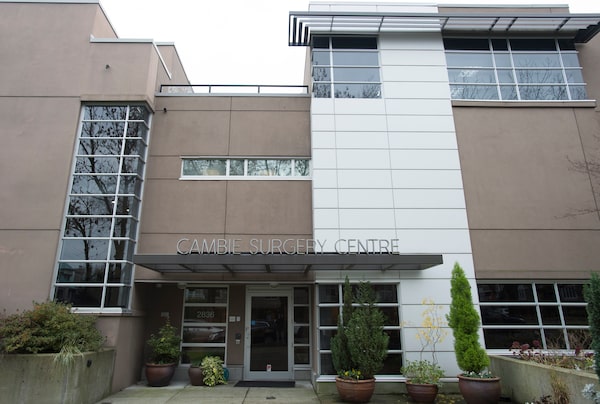
Dr. Brian Day’s Cambie Surgery Centre and other private surgical clinics have for more than two decades provided patients, who paid out of pocket, swifter diagnostic testing, specialists’ assessments and operations.JONATHAN HAYWARD/The Canadian Press
Allowing people to pay for faster access to necessary medical care would violate the fundamental principles on which British Columbia’s universal health-care system is founded and leave those who depend on it most in a worse position, a lawyer for B.C.’s Attorney-General has told B.C. Supreme Court.
Jonathan Penner on Tuesday began closing arguments for the defendants in a decade-long constitutional challenge of B.C.’s Medicare Protection Act, saying the plaintiffs seek an unfair, two-tier system that would primarily benefit the “wealthy, young, urban elites” who can afford it.
“The British Columbians who continue to rely on the public system would be worse off than they are now,” Mr. Penner told Justice John Steeves.
“The evidence before the court, from around the world, demonstrates that the introduction of duplicate private health insurance would not improve wait times for scheduled surgeries, and would likely make them worse.”
Such a system would also bring about a number of other negative effects on to the public system, he said.
“Those with complex chronic illness, the frail, elderly, and those with moderate to severe mental illness – British Columbians who will have the least ability to take advantage of the new tier of care,” Mr. Penner said. “Those are the people for whom medicare was designed, and the court cannot ignore the implications of the plaintiffs’ claim for them.”
On Monday, B.J. Wray, representing the Attorney-General of Canada, said the case was motivated by profit because doctors enrolled in the public system are prohibited from charging patients for medically necessary services in private clinics.
“The corporate plaintiffs want to make steady money in the public system and then make more money in the privately funded system,” she said.
The plaintiffs, led by Vancouver orthopedic surgeon and private-medicine advocate Brian Day, argue that patients have a constitutional right to pay out of pocket for swifter access to necessary medical care when waiting times in the public system are too long.
Last week, Peter Gall, a lawyer for the plaintiffs, invoked several of Canada’s most pivotal constitutional challenges in contending that government has no right to deprive citizens of their right to protect themselves from harm.
Decisions that struck down Canada’s prostitution laws, opened the door to medical assistance in dying and ordered Ottawa to stop interfering with the Insite supervised drug-consumption site show that the state cannot impose unnecessary harm by preventing people from making their own health decisions, Mr. Gall said.
Dr. Day said thousands of British Columbians wait beyond B.C.'s established maximum allowable waiting times and have no recourse.
“What we believe is that the government can’t have it both ways: You cannot promise health care and then fail to deliver it in a timely matter, and at the same time make it unlawful for an individual to take care of their own health," he told reporters outside the courthouse last week.
On Tuesday, Jacqueline Hughes, also representing B.C.’s Attorney-General, took issue with the plaintiffs’ claim that the case is being brought on behalf of “all British Columbians,” arguing that claims of Charter breaches must be brought within the context of specific facts of an individual’s case.
For more than two decades, Dr. Day’s Cambie Surgery Centre and other private surgical clinics have provided patients, who paid out of pocket, swifter diagnostic testing, specialists’ assessments and operations. The practice violates a law that Gordon Campbell, B.C.'s Liberal premier from 2001 to 2011, and his government chose not to enforce – just like its NDP predecessors.
Dr. Day launched a constitutional challenge in 2009; the case landed in B.C. Supreme Court in 2016 with support from four of his patients.
With a report from The Canadian Press
 Andrea Woo
Andrea Woo